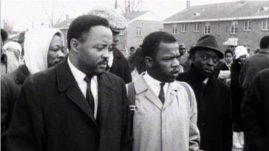Teachers' Domain - Digital Media for the Classroom and Professional Development
User: Preview

Source: Finding Your Roots: "John Lewis and Cory Booker"


“The right of citizens of the United States to vote shall not be denied or abridged by the United States or by any state on account of race, color, or previous condition of servitude.” With these words, the 15th Amendment granted black male citizens the right to vote. This Amendment was passed by Congress in February 1869 and ratified in February 1870. Following the passage of the 13th and 14th Amendments that freed slaves and granted African Americans citizenship, the 15th Amendment appeared to be the final step in African Americans’ struggle for equality. However, it would be nearly a century before all African Americans in the South could fully enjoy the right and privilege of voting.
Throughout the 1880s, African Americans in some Southern states exercised their right to vote. In the 1890s, though, unofficial rules and regulations for voting began to appear in many former Confederate states. For example, literacy tests were implemented. ”Grandfather” clauses were passed that allowed individuals to vote only if their father or grandfather had voted prior to 1869. Many Southern states included such discriminatory practices in their state constitutions.
African American voter disenfranchisement continued well into the 20th century under Jim Crow laws. Literacy tests were used to keep African Americans (as well as impoverished white people) from voting. The questions on the test were often inordinately difficult and included very obscure information. In addition, voter registration officials issued the tests when they wanted to do so. For example, registration officials could give a white person the easiest question on the test and “pass” that person, but they could choose to give an African American attempting to register to vote the entire test, and mandate he complete it within a certain time limit with 100% accuracy. The voter registration officials more or less had carte blanche to register (or not register) whomever they pleased.
Literacy tests were not the only hurdle African Americans faced when they were registering to vote. Poll taxes existed that were often too expensive for African Americans. If they could not pay the poll tax, they could not vote. Polling places were also designated to disenfranchise the African American vote. They were often located too far for African Americans to walk, making it difficult for them to even get to the voting locations. Finally, general intimidation and terrorism were used to keep African Americans from voting. Such intimidation not only came from fellow citizens, but also from law enforcement officials.
President Lyndon Johnson responded to the discriminatory voting practices occurring in the South by signing into law the Voting Rights Act of 1965. This law banned all attempts at disenfranchising the African American vote, including literacy tests, poll taxes, and terrorism. Nearly 100 years after the 15th Amendment was passed guaranteeing the right to vote to every citizen, African Americans nationwide were finally able to exercise one of the most basic rights as a citizen of the United States: the right to vote.
HENRY LOUIS GATES, JR.: March 7th, 1965. Would you please take me through that terrible day in Selma?
JOHN LEWIS: That Sunday afternoon, we lined up in twos to walk in a peaceful, nonviolent fashion from Selma to Montgomery.
LEWIS (ARCHIVAL): "We are marching today to dramatize to the nation, to dramatize to the world that hundreds and thousands of negro citizens of Alabama but particularly here in the black belt area, denied the right to vote and we intend to march to Montgomery to put this insane grievance to Governor Wallace…"
JOHN LEWIS: I was wearing a backpack. In this backpack, I had two books. I had an apple, and I had an orange, and toothpaste and toothbrush.
HENRY LOUIS GATES, JR.: Hum.
JOHN LEWIS: I thought we were going to be arrested and that we were going to go to jail.
We came to the highest point on the bridge. Down below we saw a sea of blue.
HENRY LOUIS GATES, JR.: Hum.
JOHN LEWIS: Alabama State troopers. The sheriff’s name was Jim Clark.
HENRY LOUIS GATES, JR.: Um-hum.
JOHN LEWIS: He was a very big man. He had a lapel button that said "never." He said, "This is an unlawful march and it will not be allowed to continue. I give you three minutes to disperse and return to your church." And Jose Williams from Dr. King’s organization spoke up and said, "give us a moment to kneel and pray." And the major said, "Troopers, advance."
NARRATOR: The images captured that day in Selma are seared onto our national consciousness. And as we look at them now it seems unbelievable that the African American right to vote could have posed such a profound threat as to incite this kind of violence.
JOHN LEWIS: The vote is the most powerful instrument, the most powerful nonviolent tool in a democratic society.
 Loading Standards
Loading Standards